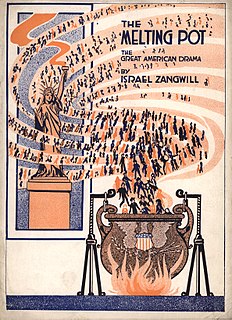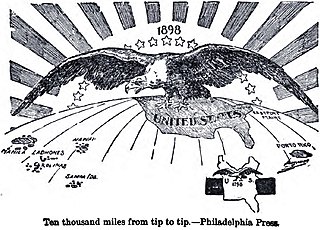
Advanced Chemistry is a German hip hop group from Heidelberg, a scenic city in Baden-Württemberg, South Germany. Advanced Chemistry was founded in 1987 by Toni L, Linguist, Gee-One, DJ Mike MD and MC Torch. Each member of the group holds German citizenship, and Toni L, Linguist, and Torch are of Italian, Ghanaian, and Haitian backgrounds, respectively.

Cultural imperialism, also called cultural colonialism, comprises the cultural aspects of imperialism. "Imperialism" here refers to the creation and maintenance of unequal relationships between civilisations, favouring a more powerful civilisation. Thus cultural imperialism is the practice of promoting and imposing a culture over a less powerful society. This may take the form of cultural hegemony of industrialised or politically and economically influential countries influencing general cultural values and standardising (globalising) civilisations elsewhere.

The melting pot is a monocultural metaphor for a heterogeneous society becoming more homogeneous, the different elements "melting together" with a common culture; an alternative being a homogeneous society becoming more heterogeneous through the influx of foreign elements with different cultural backgrounds, possessing the potential to create disharmony within the previous culture. Historically, it is often used to describe the cultural integration of immigrants to the United States.

American imperialism consists of policies aimed at extending the political, economic and cultural influence of the United States over areas beyond its boundaries. Depending on the commentator, it may include military conquest, gunboat diplomacy, unequal treaties, subsidization of preferred factions, economic penetration through private companies followed by a diplomatic or forceful intervention when those interests are threatened, or regime change.
Assimilation may refer to:

Acculturation is a process of social, psychological, and cultural change that stems from the balancing of two cultures while adapting to the prevailing culture of the society. Acculturation is a process in which an individual adopts, acquires and adjusts to a new cultural environment as a result of being placed into a new culture, or when another culture is brought to you. Individuals of a differing culture try to incorporate themselves into the new more prevalent culture by participating in aspects of the more prevalent culture, such as their traditions, but still hold onto their original cultural values and traditions. The effects of acculturation can be seen at multiple levels in both the devotee of the prevailing culture and those who are assimilating into the culture.

Cocacolonization refers to the globalization of American culture pushed through popular American products such as soft drink maker Coca-Cola. It is a portmanteau of the name of the multinational soft drink maker and "colonization".
Gook is a derogatory term for people of Asian descent. Its origin is unclear, but it may have originated among U.S. Marines during the Philippine–American War (1899–1902). Historically, U.S. military personnel used the word to refer to non-Americans of various races. The earliest published example is dated 1920 and notes that U.S. Marines then in Haiti used the term to refer to Haitians. It acquired its current racial meaning as a result of the Vietnam War.
Cultural assimilation is the process in which a minority group or culture comes to resemble a society's majority group or assume the values, behaviors, and beliefs of another group whether fully or partially. There are different forms of cultural assimilation. Some types of cultural assimilation resemble acculturation in which a minority group or culture completely assimilates into the dominant culture in which defining characteristics of the minority culture are less obverse or outright disappear; while in other types of cultural assimilation such as cultural integration mostly found in multicultural communities, a minority group within a given society adopts aspects of the dominant culture through either cultural diffusion or for practical reason like adapting to another society's social norms while retaining their original culture. A conceptualization describes cultural assimilation as similar to acculturation while another merely considers the former as one of the latter's phases. Throughout history there have been different forms of cultural assimilation examples of types of acculturation include voluntary and involuntary assimilation. Assimilation could also involve the so-called additive acculturation wherein, instead of replacing the ancestral culture, an individual expands their existing cultural repertoire.
Native American studies is an interdisciplinary academic field that examines the history, culture, politics, issues, spiritual, sociology and contemporary experience of Native peoples in North America, or, taking a hemispheric approach, the Americas. Increasingly, debate has focused on the differences rather than the similarities between other Ethnic studies disciplines such as African American studies, Asian American Studies, and Latino/a Studies.

Americanization is the process of an immigrant to the United States becoming a person who shares American values, beliefs, and customs by assimilating into American society. This process typically involves learning the American English language and adjusting to American culture, values, and customs.
In American media, the term Americanization is used to describe the censoring and editing of a foreign TV show or movie that is bought by an American station. This editing is done with the aim of making the work more appealing to American audiences, and to respond to perceived American sensitivities. The changes can be so drastic that little—if any—evidence of the TV show or movie's true origin remains.
The cultural assimilation was a series of efforts by the United States to assimilate Native Americans into mainstream European–American culture between the years of 1790 and 1920. George Washington and Henry Knox were first to propose, in an American context, the cultural assimilation of Native Americans. They formulated a policy to encourage the so-called "civilizing process". With increased waves of immigration from Europe, there was growing public support for education to encourage a standard set of cultural values and practices to be held in common by the majority of citizens. Education was viewed as the primary method in the acculturation process for minorities.

Swedish–American relations reach back to the days of the American Revolutionary War. The Kingdom of Sweden was the first country not formally engaged in the conflict to recognize the United States before the Treaty of Paris. The Treaty of Amity and Commerce was signed subsequently in 1783 between Benjamin Franklin and Swedish representative Gustaf Philip Creutz.

John Collier, a sociologist and writer, was an American social reformer and Native American advocate. He served as Commissioner for the Bureau of Indian Affairs in the President Franklin D. Roosevelt administration, from 1933 to 1945. He was chiefly responsible for the "Indian New Deal", especially the Indian Reorganization Act of 1934, through which he intended to reverse a long-standing policy of cultural assimilation of Native Americans.

The role of the media in the perception of the Vietnam War has been widely noted. Intense levels of graphic news coverage correlated with dramatic shifts of public opinion regarding the conflict, and there is controversy over what effect journalism had on support or opposition to the war, as well as the decisions that policymakers made in response.

Americanization is the influence of American culture and business on other countries outside America, including their media, cuisine, business practices, popular culture, technology or political techniques. The term has been used since at least 1907. It is not a pejorative term but is often used by critics in the target country who are against the influences.
An Asian fetish is a strong sexual or romantic preference for persons of Asian descent. The term generally refers to people of East or Southeast Asian descent, though may also encompass those of South Asian descent.
Deculturalization is the process by which an ethnic group is forced to abandon its language, culture, and customs. It is the destruction of the culture of a dominated group and its replacement by the culture of the dominating group. Deculturalization is a slow process due to its extensive goal of fully replacing the subordinate ethnic group's culture, language, and customs. This term is often confused with assimilation and acculturation.

The United Front for the Liberation of Oppressed Races waged a nearly three decade long insurgency against the governments of North and South Vietnam, and later the unified Socialist Republic of Vietnam. The FULRO insurgents represented the interests of minority Muslim and Hindu Cham, Christian Montagnards, and Buddhist Khmer Krom against the ethnic Kinh Vietnamese. They were supported and equipped by China and Cambodia according to those countries' interests in the Indochina Wars.











